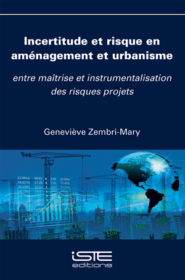
Geneviève Zembri-Mary
Incertitude et risque en aménagement et urbanisme. Entre maîtrise et instrumentalisation des risques projets.
ISTE Editions, 2020, 314 p.
Les associations, élus, experts, habitants ou maîtres d’ouvrages concernés par les opérations d’aménagement et d’urbanisme et les projets de transport font face à un contexte incertain, dans lequel ils doivent appréhender, traiter ou tirer avantage du risque. Les risques sont multiples, ils peuvent être sociaux, politiques, institutionnels, financiers, environnementaux ou archéologiques.
Cet ouvrage examine l’origine et la nature des incertitudes et des risques ainsi que les pratiques mises en oeuvre pour les atténuer ou en tirer parti. Paradoxalement, ces pratiques génèrent de nouveaux risques et des relations de pouvoir entre acteurs différentes du modèle de planification collaborative de référence.
Ces paradoxes nécessitent de repenser les pratiques telles que la territorialisation des projets, la prise de risque dans la planification et la réalisation des opérations, ou encore les choix sociétaux et politiques qui doivent être faits entre la réalisation des projets et la protection de l’environnement naturel et humain.
La version anglaise :

Geneviève Zembri-Mary
Actions around uncertainty in Urban Planning and Infrastructure Development
London, ISTE / WILEY, 2019, 316 p.
Those tasked with the planning and construction of infrastructure and development operations face an increasingly uncertain context in which they must address risks across a number of different fields. These range from the environmental and archaeological to the social, political and financial. As a consequence, the formal and informal practices of stakeholders often incorporate projections of risk and opportunity.
Project Risks analyzes this paradigm shift. It reviews the origin and nature of these uncertainties, and the practices implemented by the actors to mitigate or take advantage of them. Paradoxically, these practices generate new risks and power relations that are not compatible with the collaborative planning model. These paradoxes force the rethinking of practices such as project territorialization, risk taking in planning and the responsibility of actors, as well as the societal and political choices that must be made between the realization of projects and the protection of the environment.





